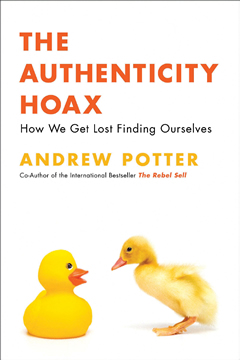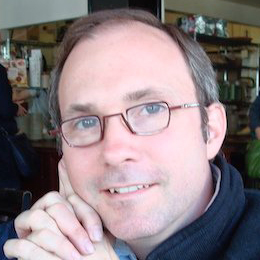It’s one of the most famous – and nastiest – exchanges in literary history. A young writer, Jean-Jacques Rousseau, sends France’s reigning man of letters, Voltaire, a copy of his second book – in which he argues that men got along better in a state of nature than under civilization’s yoke. Voltaire responds trenchantly: “I have received your new book against the human species… to read your book makes one long to go on all fours.”
This exchange – and the underlying philosophical debate between believers in the overall benefits of Western civilization and its severe critics – underlies The Authenticity Hoax: How We Get Lost Finding Ourselves by Andrew Potter. As Potter presents it, Rousseau’s views have markedly affected key social and artistic movements over the last two centuries. Rousseau idealized the natural world and man’s place in it, inspiring everyone from the Romantic poets to the latest inheritors, the Declinists.
As the name would suggest, Declinists worry that we’re on a downward trajectory, that we’re losing touch with nature and our authentic selves, getting lost in the superficial pandemonium of shopping malls and suburbs. The Declinists (he numbers Prince Charles, Al Gore and David Suzuki among them) are determined to escape shallow modernity by questing for authentic experiences. Different people seek this escape in different fashions: through eating organically and locally; through extreme eco-tourism; through yoga and meditation. To Potter (MA 1994, PhD 2000), these purported quests to live more authentically are often disguised status-seeking – the latest way to put those pesky Joneses in their place. “I know this great little Oaxacan cafeteria in this weird industrial area in the West End…”
These assorted rejections of mainstream culture and capitalism are misguided, according to Potter; more than this, they are dangerous. For Potter, the Western authenticity seeker and the anti-American terrorist share a surprisingly similar world view, if wholly different approaches to forwarding their agenda. “This description of al-Qaeda,” he writes, “as an authenticity movement devoted to the rejection of American consumer capitalism helps explain one of the strangest formations on the post-9/11 intellectual landscape, which is the widespread sympathy from the left for the broad themes, if not the explicit theses, of al-Qaeda.” Modern living may not be the best of all possible worlds, but nor is it as bad as its detractors maintain. Our life expectancy has soared over the last two centuries, our quality of life is vastly better than our ancestors’. Potter doesn’t dismiss the worries of the environmental movement, but he thinks we should be careful when we fantasize about getting ourselves back to the garden.
Recent Posts
U of T’s Feminist Sports Club Is Here to Bend the Rules
The group invites non-athletes to try their hand at games like dodgeball and basketball in a fun – and distinctly supportive – atmosphere
From Mental Health Studies to Michelin Guide
U of T Scarborough alum Ambica Jain’s unexpected path to restaurant success
A Blueprint for Global Prosperity
Researchers across U of T are banding together to help the United Nations meet its 17 sustainable development goals







One Response to “ The Lost Left ”
Was I the only person who found this review rather horrifying? To have peaceful opposition and criticism condemned as "dangerous," and equated with the terrorism of al-Qaeda is tantamount to fascism.